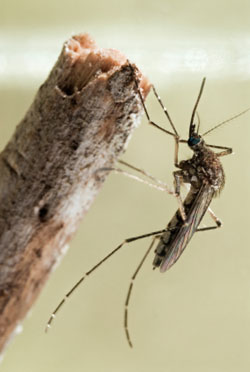Tiny Mosquito
The Mosquito Life Cycle
The mosquito life cycle can only begin in an aquatic environment. The female mosquito lays between 50 and 100 eggs on the water’s surface, and so it begins. While both male and female mosquitoes feed on nectar, only the female mosquito feeds on blood in order to produce her offspring. Male mosquitoes live for about two weeks, while females live from three weeks to several months, and can lay approximately 500 eggs during its life span.
The mosquito life cycle
 A female mosquito’s eggs will hatch within 24 hours and will develop
into larvae. Mosquito larvae or “wigglers” must breathe air
to survive; hence they remain on the water’s surface and feed by
filtering small particles from the water. They will occasionally dive
down into the water for nourishment, or to escape from predators. During
this stage, the larvae will molt approximately 4 times and grow rather
quickly. After the fourth molting, they develop legs and wings and become
pupae. Pupae or “tumblers” breathe air through two tubes located
on their back; they cannot eat. It is from inside the pupal lining that
mosquitoes emerge as adults within two days. They will rest on top of
the water until they are strong enough to fly, at which time they will
search for food. When the temperature is favourable, the mosquito life
cycle, from egg to adult, can be completed in 10 days, in less time during
the warm summer months.
A female mosquito’s eggs will hatch within 24 hours and will develop
into larvae. Mosquito larvae or “wigglers” must breathe air
to survive; hence they remain on the water’s surface and feed by
filtering small particles from the water. They will occasionally dive
down into the water for nourishment, or to escape from predators. During
this stage, the larvae will molt approximately 4 times and grow rather
quickly. After the fourth molting, they develop legs and wings and become
pupae. Pupae or “tumblers” breathe air through two tubes located
on their back; they cannot eat. It is from inside the pupal lining that
mosquitoes emerge as adults within two days. They will rest on top of
the water until they are strong enough to fly, at which time they will
search for food. When the temperature is favourable, the mosquito life
cycle, from egg to adult, can be completed in 10 days, in less time during
the warm summer months.
Types of mosquitoes that breed around the home
The presence of mosquitoes in your neighbourhood does not necessarily
mean that they bred close by; mosquitoes have the capacity to fly far
distances from their breeding grounds. However, the mosquito life cycle
can begin in your own backyard. Mosquitoes breed in eaves troughs, birdbaths,
and any stagnant water around your property.
The most common type of mosquito is the Culex pipiens. It thrives on water that contains organic wastes. The females feed mostly at night on birds, which makes them the primary carriers of the mosquito-borne West Nile virus. Another common species of mosquito is the Culex restuans, which females usually lay their eggs in the same kinds of locations as the Culex pipiens, but do not usually bite humans.
Ways to control breeding sites
Female mosquitoes are generally selective when choosing a site to lay
their eggs, seeking clean water in the wild. However, many types of mosquitoes
that breed in residential areas will tolerate polluted water. Therefore,
it is important to eliminate all standing water on your property, including
water in rain barrels, buckets, tires, birdbaths, children’s toys,
and any long-standing puddles. Repair all leaks on exterior faucets, hoses,
pools, and sprinkler systems to ensure that no water collects. If the
water source is cut off and dries up during the developmental stages of
the insect, the mosquito life cycle will be disrupted.
Many homeowners purchase expensive equipment such as big-zappers and devices that emit so-called mosquito attractants (carbon-dioxide, warmth, and light.) to rid themselves of these pesky insects. However, such products have seldom shown significant results in reducing the mosquito population.
To eliminate mosquito breeding sites, a mosquito larvicide can be purchased. Larvicides contain chemicals that eliminate the mosquito in its immature stages and halt the mosquito life cycle in its tracks. These chemicals are called methoprene and bacillus thuringiensis israelensis (BTI). However, since mosquitoes have the capacity to fly far from their breeding grounds, you may experience pest control problems without having a breeding ground nearby. There are also registered effective mosquito repellent products for lawns and vegetation specifically designed for use on adult mosquitoes. These chemicals go by the names of cyfluthrin, lambda-cyhalothrin, and permethrin, and can be applied to shrubs, low tree limbs, shaded areas under decks, and along the dwelling’s foundation. Most come in sprays, and must be re-applied periodically for maximum efficiency. Be sure to use insecticides exactly as indicated on their labels. For the least effort involved, hire a professional company to do the job.
Written by Karen Foster: Karen Foster is the content manager and editor for Tiny Mosquito: Understanding the Mosquito. For more information about mosquitoes, visit her site at www.tinymosquito.com.
Home - Mosquitoes - Bites - Control - Diseases - Resources - Site Map